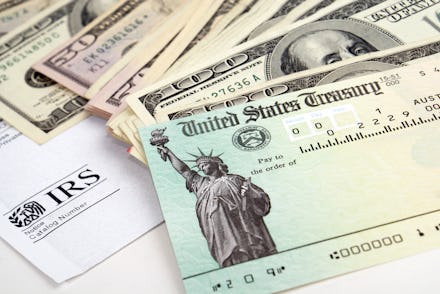Do I have to pay taxes on my refund? How to know if refunds count as taxable income.

So you got a tax refund. Sweet. Although the downside to getting money back from the Internal Revenue Service is that you've effectively given Uncle Sam an interest-free loan, it's always nice to get a big check in the mail.
But there's yet another annoying catch to getting a refund: As weird as it may seem, there are times when you will actually owe taxes on the refund itself. Here's when a refund is taxable and when it's not.
IRS refunds are rarely taxable
First things first: If your refund comes from the federal government, it's not taxable income. You're just getting back your own money that you overpaid in taxes to the government.
There is one exception, however: You'll have to pay taxes on any interest the IRS pays you on a refund.
There are two times when this might happen. If the IRS takes more than 45 days from your tax filing date to issue your refund, they may owe you interest on your refund, according to USA Today. The IRS may also pay you interest if you filed an amended return that results in them owing you money.
State tax refunds can be taxable
If you took the standard deduction, your state refund isn't taxable. So you can spend or save that refund without worrying about owing any money on it.
If you itemized your deductions, opted to deduct your state income tax and then got a state tax refund, you'll have to declare at least part of the refund amount as income.
The good news is that you don't have to declare the refund income until the year after you get it. That means any refund on state taxes filed in 2017 (for the 2016 tax year) don't have to be declared until 2018 (on line 10 of your 1040) when you file your 2017 taxes. Phew!
Why do you pay taxes on a tax refund?
You're probably wondering why on Earth you have to pay taxes on a tax refund. Here's why.
When you filed your federal 2016 tax return and deducted state income taxes that you paid, you told the IRS you paid a certain amount to your state — let's say $1,000. The IRS let you deduct that $1,000, so you weren't taxed on it by the federal government.
Now, let's say the state sends you back $250 because you overpaid your taxes. The IRS already gave you credit for $1,000. You underpaid the IRS by claiming more of a credit for state income taxes than you actually deserved.
How to figure out if you owe money on your refunds
If you're like a lot of people and used a tax program to do your taxes, you may not actually know — or need to know — if you took a deduction for your state taxes. As long as you saved your past returns in the software, it will import last year's information for your current return. The program will also do the math for you after you input the amount of your state tax refund, which is on the 1099-G form your state sends you.
If you're doing taxes on your own, or are using new software for the first time, you'll need to check your prior year's returns to determine if you deducted state tax. This guide from the Balance walks you through how to do it so you don't wind up getting a letter from the IRS demanding even more of your hard-earned cash.
Sign up for The Payoff — your weekly crash course on how to live your best financial life. Additionally, for all your burning money questions, check out Mic’s credit, savings, career, investing and health care hubs for more information — that pays off.